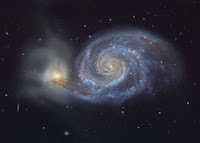Pantheism can perhaps best be understood by comparing it to theism. Pantheism denies two principal tenets of theism: it denies that the divine, the sacred, the numinous is in any sense a person, with intentions, goals, preferences, emotions, or desires; and it denies that the divine, the sacred, the numinous is in any way transcendent or ontologically distinct from the universe. On the other hand, pantheism affirms a principal tenet of theism: it affirms that there is such a thing as the divine, the sacred, the numinous. Traditional pantheists have been perfectly willing to talk about God, but not in any way that implies that God is either personal or transcendent.
Now, a theist would say that pantheism, in its denial of divine personhood and transcendence, looks a lot like atheism, and therefore should not be using the word God at all, even as stipulatively redefined. Contemporary pantheists have not had much of a problem with that. Indeed, the word God looks an awful lot like a proper name; the proposed alternative terms — such as the divine, the sacred, the numinous — are more easily read as pointing to an experience rather than a thing.
 |
Contemporary pantheists tend to define what is sacred not in terms of its own essence or attributes but rather in terms of the human response to encountering it. Thus, unlike panpsychism, we do not find much philosophical argument in favor of pantheism. Pantheist argument tends rather to take the form of an appeal to the experience of awe, wonder, and mystery in the presence of the natural world. Contemporary pantheists thus often refer to theologian Rudolf Otto’s experiential formulation of the sacred as a mysterium tremendum et fascinans, a mystery that is both overpowering and compelling. Cosmologist Brian Swimme, for example, defines the numinous as “being shocked by the splendor of existence.” Poet Walt Whitman put it this way: “Every cubic inch of space is a miracle.”
Thus, to the extent that the universe evokes astonishment, dread, wonder, awe, humility, and love, the universe is sacred. That the Earth is sacred follows naturally from experience — being caught on a rocky mountain spur in the middle of a lightning storm, for example, or seeing the Mojave desert momentarily awash with golden flowers. Contemporary science, including images from the Hubble Telescope, suggests that the entire universe is sacred in the same way as the Earth.
Now, there are versions of pantheism that discard one or the other of its two theistic denials. Pantheism asserts that the sacred is fully immanent — that the sacred and the universe are entirely coextensive. Panentheism asserts that the sacred — which is starting to look like God again — is partially, or in some respect, transcendent as well as immanent. Panentheism often appears to be more a sort of ecological theism than a variant of pantheism.
 |
The other version is, I think, more interesting. Pantheism asserts that the sacred is not a person. The claim that the sacred universe is in some sense a person does not have a specific philosophical name; we can call it personalist pantheism.
Types of more-or-less personalist pantheisms may be found in Gaia philosophy, the work of Teilhard de Chardin, the creation spirituality of Matthew Fox, process theology, and especially in the new universe story proposed by such thinkers as Brian Swimme and Thomas Berry. These thinkers suggest that the evolution of the universe is in some sense purposeful, and that its telos or endpoint is not just awareness but self-awareness. Although self-awareness is primarily exemplified in human beings, it may be the endpoint of the natural world as a whole.
Thus, not just the earth but the entire universe can be seen as moving beyond systemic self-regulation into some form of sentience or awareness, even purpose or desire. Swimme and Berry say that the “Earth seems to be a reality that is developing with the simple aim of celebrating the joy of existence.”
And that is why Brian Swimme calls the universe a green dragon — “because the whole universe is alive, an embryogenesis beginning with the cosmic egg of the primeval fireball and culminating in the present emergent reality,” and because dragons are “mystical, powerful, emerging out of mystery, disappearing in mystery, fierce, benign, known to teach humans the deepest reaches of wisdom.”
Note that, unlike panpsychism, such a view would claim experiences, mental events, or qualia for the universe as a whole rather than, or in addition to, the mental experiences of all of its individual components. I do not know whether it is consistent to be both a panpsychist and a pantheist in this latter sense. But since the universe as a whole has an organizational complexity far beyond that of a human brain, I am inclined to think that the conscious experience of the universe must be rich beyond our imagining.
If the entire universe is sacred and numinous, it is often then taken as somehow obvious that this sacrality is evenly distributed. I know of no a priori reason to believe that is so. In fact, I believe that experience would seem to be to the contrary. Cultures and individuals throughout history have deemed certain places or times to be more sacred or holy than others, and thus as constituting what we can call pools of sacrality.
On the other hand, perhaps sacrality is evenly distributed, and we just do not see it, as the result of a sort of congenital blindness of the soul. Perhaps there is a form of pantheistic human perfection, which is to come to see the sacred everywhere, even in the most neglected and despised, even in what most terrifies us, even in the worst parts of the world.
And that, I think, may be where pantheism and shamanism intersect.

- Previous Post: DMT: The Movie
- Next Post: Shamanism and Conjuring
- More Articles Related to: Shamanism



we had a really amazing discussion on this subject in the pagan bioregional animist tribe. check it out if you like…
http://tribes.tribe.net/bioregionalpaganism/thread/cfddc98f-8042-4e3d-997b-2a9e61086098
There is, of course, always pandeism, which takes pantheism a bit further down the spiritual road and proposes a pre-Universe divine being who becomes the Universe in order to enjoy its activities. Of course, this is without interference, so the pandeistic model is kin to deism in that sense, and the pandeist has no one to pray to.